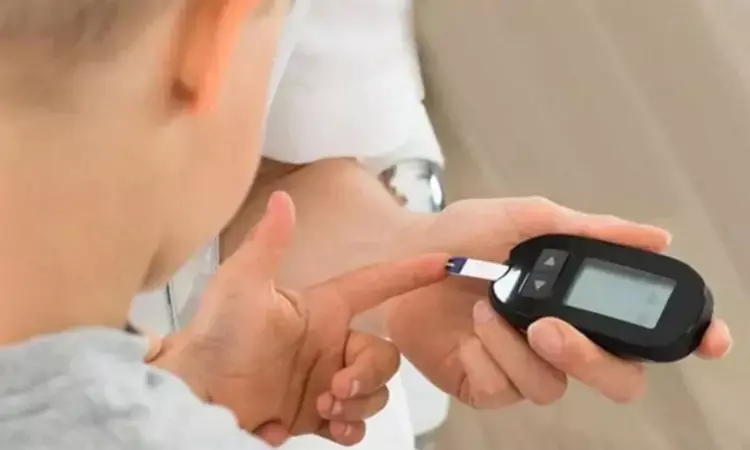- Home
- Medical news & Guidelines
- Anesthesiology
- Cardiology and CTVS
- Critical Care
- Dentistry
- Dermatology
- Diabetes and Endocrinology
- ENT
- Gastroenterology
- Medicine
- Nephrology
- Neurology
- Obstretics-Gynaecology
- Oncology
- Ophthalmology
- Orthopaedics
- Pediatrics-Neonatology
- Psychiatry
- Pulmonology
- Radiology
- Surgery
- Urology
- Laboratory Medicine
- Diet
- Nursing
- Paramedical
- Physiotherapy
- Health news
- Fact Check
- Bone Health Fact Check
- Brain Health Fact Check
- Cancer Related Fact Check
- Child Care Fact Check
- Dental and oral health fact check
- Diabetes and metabolic health fact check
- Diet and Nutrition Fact Check
- Eye and ENT Care Fact Check
- Fitness fact check
- Gut health fact check
- Heart health fact check
- Kidney health fact check
- Medical education fact check
- Men's health fact check
- Respiratory fact check
- Skin and hair care fact check
- Vaccine and Immunization fact check
- Women's health fact check
- AYUSH
- State News
- Andaman and Nicobar Islands
- Andhra Pradesh
- Arunachal Pradesh
- Assam
- Bihar
- Chandigarh
- Chattisgarh
- Dadra and Nagar Haveli
- Daman and Diu
- Delhi
- Goa
- Gujarat
- Haryana
- Himachal Pradesh
- Jammu & Kashmir
- Jharkhand
- Karnataka
- Kerala
- Ladakh
- Lakshadweep
- Madhya Pradesh
- Maharashtra
- Manipur
- Meghalaya
- Mizoram
- Nagaland
- Odisha
- Puducherry
- Punjab
- Rajasthan
- Sikkim
- Tamil Nadu
- Telangana
- Tripura
- Uttar Pradesh
- Uttrakhand
- West Bengal
- Medical Education
- Industry
What are risk factors for ketoacidosis in children with type 1 diabetes?

China: A recent study has revealed a close relation of high levels of HbA1c, random blood glucose, blood ketone body, and triglyceride on admission with the development of diabetic ketoacidosis (DKA) in children/adolescents with type 1 diabetes mellitus (T1DM).
Researchers, in their study published in the Chinese Journal Of Contemporary Pediatrics, suggest the development of targeted intervention measures to reduce their risk of DKA.
The study was conducted by WANG Xiao-Jia, School of Public Health, Ningxia Medical University, Yinchuan, China, and colleagues to investigate the risk factors for diabetic ketoacidosis in children/adolescents with type 1 diabetes and to establish a model for predicting the risk of DKA.
For this purpose, the research team performed a retrospective analysis on 217 children/adolescents with T1DM, admitted to the General Hospital of Ningxia Medical University from 2018 to 2021. Among the 217 children/adolescents, 169 cases with DKA were included in the DKA group and 48 cases without DKA were included in the non-DKA group.
The risk factors for DKA in children/adolescents with T1DM were analyzed, and for predicting the risk of DKA in children/adolescents with T1DM, the nomogram model was established.
The study revealed the following findings:
- For the 217 children/adolescents with type 1 diabetes, the incidence rate of DKA was 77.9%.
- The multivariate logistic regression analysis showed that high levels of random blood glucose, haemoglobin A1c (HbA1c), a blood ketone body, and triglyceride on admission were closely associated with the development of DKA in the children/adolescents with T1DM (OR=1.156).
- The nomogram prediction model had a C-statistic of 0.95, with a mean absolute error of 0.004 between the risk of DKA predicted by the nomogram model and the actual risk of DKA, indicating that the model had a good overall prediction ability.
"High levels of HbA1c, triglyceride, random blood glucose, and blood ketone body on admission are closely associated with the development of DKA in children/adolescents with T1DM," the researchers wrote, adding that, 'targeted intervention measures should be developed to reduce the risk of DKA."
Reference:
Wang, Xiao-Jia, et al. "[Risk Factors for Ketoacidosis in Children/adolescents With Type 1 Diabetes Mellitus and Establishment of a Predictive Model]." Zhongguo Dang Dai Er Ke Za Zhi = Chinese Journal of Contemporary Pediatrics, vol. 26, no. 1, 2024, pp. 62-66.
Dr Kamal Kant Kohli-MBBS, DTCD- a chest specialist with more than 30 years of practice and a flair for writing clinical articles, Dr Kamal Kant Kohli joined Medical Dialogues as a Chief Editor of Medical News. Besides writing articles, as an editor, he proofreads and verifies all the medical content published on Medical Dialogues including those coming from journals, studies,medical conferences,guidelines etc. Email: drkohli@medicaldialogues.in. Contact no. 011-43720751


